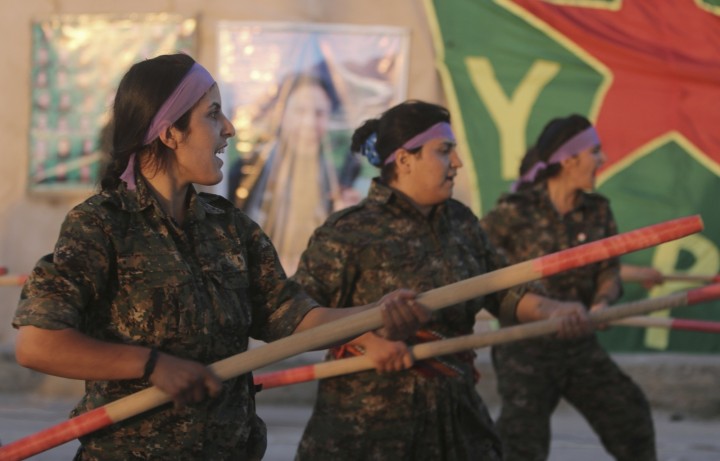
As the world twirls its thumbs, the brave Kurdish women of the city of Kobani, on the border between Syria and Turkey are fending off the savages of Islamic State, know locally as Daish (for its initials in Arabic). It is hard to imagine purer evil than Daish. There isn’t any criminal, barbaric act this group has not committed: mass killings and beheadings were only the warm up, forced conversions and ethnic cleansing of minorities soon followed, but even the Nazis, as far as I am aware, did not trade sex slaves openly (heck, when I quoted the Muslim woman who wanted infidel “spoils of war” women to be sex slaves, I also mentioned her critics among Muslims-but alas, her ideas about Islam and women are far from fringe). And hence the stakes for the female peshmarga (the Kurdish word for the militias) could hardly be higher.
And yet, the heroism of these women is not the only thing standing between the Daish rapists and their “prize”. The role of the US air force (to the dismay of extremist isolationists such as Ron Paul, I assume?) in defending their lives cannot be underestimated.
Kobani appeared close to falling a week ago as Islamic State entered its eastern and southern districts and raised its black flag. As recently as Saturday, Kurdish leaders were calling for the air strikes to be stepped up.
In recent days, as the air strikes have increased, the militants have made little progress. The Kurds say they have taken back areas on the west of the town. U.S. President Barack Obama expressed deep concern on Tuesday about the situation in Kobani as well as in Iraq’s Anbar province which U.S. troops fought to secure during the Iraq war.
The intensified air campaign around Kobani has lifted the spirits of Kurds who have maintained a vigil watching the fighting from a hilltop just over the border in Turkey.
Dozens cheered as a powerful air strike hit eastern Kobani on Wednesday afternoon, sending up a plume of smoke.
Abdulrahman Gok, a journalist inside Kobani, said the latest air strikes had allowed the YPG [Kurdish militia] to make some gains.
“Following the air strikes, I went to the last safe point in eastern side of the city. Some buildings that had been occupied by IS fighters were empty,” he said. “On the west, YPG destroyed a vehicle that belonged to IS and killed the militants inside.”
The other angle to the story is that the biggest local player, Turkey, was content util fairly recently to watch passively as carnage went on; according to the New York Times, Turkey would prefer to stand by as its two enemies (Daish and the Kurds) “duked it out”. Under pressure from the US, however, Turkey finally relented, allowing a trickle of the peshmarga to proceed through its territory from Iraq, to join the fight against Daish. And guess who’s very, very unhappy with this turn of events:
In the Syrian capital of Damascus, a political adviser to President Bashar Assad accused Ankara of trying to expand its influence in Syria by sending in anti-government forces.
“I see that Turkey is continuing in its role of aggression against Syria and its very dangerous role in the region,” Bouthaina Shaaban said in an interview with the AP.
Shaaban suggested Turkey was trying to revive its dominant role during the Ottoman Empire and did not care about saving the Kurds. [Lol-well at least he got it the very last part right!]
The Foreign Ministry in Damascus called the action “a blatant violation of Syrian sovereignty and international law.”
Which brings me to my final point.
While I have called the US drone war against Islamic militants a necessary evil and expressed my wishes that they could be tackled in such a way not to put civilian life in danger, I have earned the wrath of a good few of my fellow secularists, including right here on this network. And despite the points raised about drone strikes toll on civilians and their playing into the hands of militants through boosting their recruitment efforts (which I have responded to elsewhere), the bulk of the objections remains the matter of international law and sovereignty; in the words of the despicable Noam Chomsky on the killing of Osama bin Laden,
It’s increasingly clear that the operation was a planned assassination, multiply violating elementary norms of international law.
We might ask ourselves how we would be reacting if Iraqi commandos landed at George W. Bush’s compound, assassinated him, and dumped his body in the Atlantic.
So the question for Chomsky and his ilk would be, are they as much against the air campaign against Daish and the pressure on Turkey to allow help to reach the Kurds, as they have been against the drone war and the killing of bin Laden? As it happens, the Syrian regime’s objections to the latter actions stand on PRECISELY the same grounds that Chomsky and other terror apologists have used to condemn the drone war: violation of a foreign nation’s sovereignty. Whether in Syria or Pakistan, these strikes have been carried out against failed states that have already lost control over large chunks of their territory, and are totally unable (and in some cases, unwilling) to apprehend militants who have not only carried out attacks against the US and other countries, but won’t even stop making threats to repeat such acts, and hence making US action against them justifiable self defense (yes, under the international law). And if they are willing to side with the regime of Syria (which they have to, if they want to be consistent) would they have rather seen Kobani fall and its women “marketed” already?
***
Image credit:
